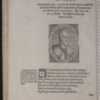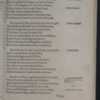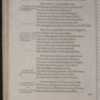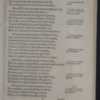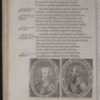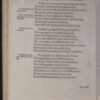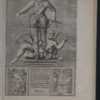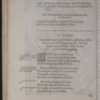Liedt. Inhoudende int corte, 'tverhael des vierden boecx vande Nederlantsche Oorloch
Title
Subtitle
Synopsis
Digital Object
Image notice
Image / Audio Credit
Set to tune of...
Transcription
DE Nederlantsche Heeren seer vermaert,
Hebben van outs, vermits sy vele Rijcken
Besaten, die sy niet conden beswijcken:
Hier gestelt op dat 't Landt sou zijn bewaert,
Een Gouverneur gemeenlijck van haer bloet,
Die als hy selfs in alles mocht gebieden,
Nade wetten en Privilegien goet,
Op dat geen tiranny soude geschieden.
Den Raedt die by den Gouverneur resideert,
Die wert alhier genoemt den Raedt van Staten,
Daermen al dat tot 's Lants voordeel en baten,
Tzy van Vrede goet ofte Oorloch verkeert,
Besluyt, somen oock in den Raet secreet
Handelt van privilegien statuyten,
Van 's Lants grensen, ende al datmen weet,
Dat behoort tot hoocheyt binnen en buyten.
Noch heeft de Heer een Raedt die van het gelt,
'Thoochste gebiet heeft over sijn Domeynen;
Om die t'vergrooten en niet te verkleynen:
D'ordonnantien ende wetten stelt,
Oock van beden die op 's Lants-heers versoeck,
By den Staten werden geconsenteret:
Daer houdtmen hieraf Registers en Boeck,
So datmen weet waer toe 'tal wert bekeret.
Noch stelt die Landts-heere Raden met macht
Om te oordelen over de geschillen,
Die te nederleggen ende te stillen,
Omme het volck te houden in eendracht,
Voor dese Raden men in recht betrect,
Niet alleen de gemeene Ondersaten,
Maer die Landts-heer, stelt hem die self subject,
Op dat niemant yet quaets soude aenvaten.
In tijdt van Vree, is geen Krijsvolck int Landt,
Dan in Frontier-plaetsen ende Casteelen:
Men krijchtse hier licht op 's Lants-heers beveelen;
Wt nabuyrs, en eygen landt byder handt,
Geen oorlochschepen men dan oock en hout,
Om die groote costen alsdan te schouwen:
VVantmense haest gereet maeckt en opbout,
Dat 'tverwonderbaerlick is allen lantdouwen.
Nu keeren wy tot die histori weer,
De Hertogin heeft den Coninck geschreven,
Dat het nu alles was in stilte even
Gebracht, nae sijn wil ende haer begeer,
Versoeckt dat hy geen volck neer en sendt,
Dat hy costen en moeyten wel mocht sparen,
'T was al in rust, d'oproerte was geendt,
Der Spaengaerts comst, mocht nieuwe onrust baren.
Maer haer voorschrijven en wert niet geacht,
Die Resoluti die was al genomen,
Dat veel Spaengaerden int Lant souden comen,
Op datter veel souden werden gestraft:
Den Hertoch van Alva hadt dit bevel,
Die het volck vast aen allen cant vergaerde,
Op dat hy haest sou overcomn snel,
Met oorlochs volck te voet ende te paerde.
Dit maeckte int Lant een seer grote scrick,
VVant elck was in ancxte ende vol sorgen,
Dat hyder veel sou doen hangen en worgen,
Ende brengender meenicht' inden strick:
Met Spaengaerts en Italianen veel,
Quam hy int Lant, en voorts te Brusel binnen,
Besette met sijn volck Stadt en Casteel,
En dede voorts al dat hy const versinnen.
Onlancx daer na, hy snel gevangen nam,
De Graven van Egmont ende van Hooren,
Twee Nederlantsche Heeren hooch gebooren:
Heer Anthonis van Stralen eel van stam,
ie wert t' Antwerpen mee gevangen haest,
Ende meer and're in verscheyden Steden,
Doe vluchtender vele, zijnde seer verbaest,
Want dit gerucht hen haest al om verbreden.
Ducd'Alb'recht op eenen nieuwen Bloed'-raet,
Verbiet kennis te nemen alle Hoven,
Van troubels saecken, die hy gaet vergroven,
Den Coninck van 'tgouvernement ontslaet+
Sijn suster, die we'erom treckt by haer man,
Voorts beschuldicht hy, vele Magistraten,
Ende recht vele nieus en wreedtheyts an,
Hoe wel weynich tot 's Lants of Conincx baten.
Hy bout tot Antwerpen een Casteel of Slot,
Daer mee hy al d'in woonderen wil dwingen,
Naermaels bestaet hy 't oock tot Groeningen,
Oock te Vlissingen, maer 'twert daer verbrot,
Nassau, Culenburch, Hoochstraet en Breroo,
Met veel Edel Heeren doet hy indaegen,
Om t'antwoorden op syne vragen snoo,
Maer sy wachten hen voor sijn schalcke laegen.
Den Grave van Buyren des Princen soon,
Doet hy tegens 's Lants Recht, naer Spaengien voeren,
'Sgelijcx doet hy, op veel gevluchte loeren,
Om hen te brengen in verdriet en hoon:
Hy voert oock in 'tConcilie van Trent,
En nieu Bisschoppen sonder tegenspreecken,
Want elck een die vreesde sijn dreygement,
Haer herten waren al t'samen besweecken.
Als nu de Prince van Oraengien cloeck,
Het ongelijck, dat hem de Hertoch dede,
Niet langer en conde verdragen mede,
Dede hy sijn clachten aen allen hoeck,
Soeckt hulpe, die hem veel wert toegeseyt,
Van vreemde en van vrunden ende magen,
Dees toonden hen daer toe te zijn bereydt,
VVant vele mosten oock dit leet verdragen.
De Graef vanden Berch, neemt 's Heren-berch in,
Maer hy wert daer haest weder wt gedreven:
Graef Lodewijck heeft veel volcx aengeschreven,
En krijcht haest 't Huys te VVedde tot gewin,
Neemt oock den Dam, en ander plaetsen meer,
Arenberch treckt hem met veel Spaengaerts tegen,
VVert daer verslagen, Lodewijck behaelt eer,
En heeft daer veel buyts en geschuts gekregen.
Doch sijn broeder Graef Adolph van Nassau,
Bleef daer oock doot, met veel vrome Lants-knechten,
Men deed' daech'licx niet dan schermutsen vechten,
Men maeckte de boeren vast cael en rau:
Den Hertoch van Alba hier door gestoort,
Dede wt spijt Graven en Edlen dooden,
Aen Egmont en Hoorne wert dit gespoort,
En an'dre meer, dien hy 'tleven wtrooden.
Daer na tooch hy te velde wel gemoet,
Om te levren slach, aen 'tvolck van Nassouwen,
Dees riepen gelt, en bleven int benouwen,
Want de Spaengaert vol trots ende verwoet,
Spaerde niemant, sloechse int vluchten doot,
Dan Graef Lood'wijck ist noch met veel ontcomen,
Som verdroncken, en quamen in doots noot,
Hier door wert de hoope van veel benomen,
Maer de Prince, neemt oock die Oorloch aen,
Heeft veel schoon volcx, Oversten, Capiteynen,
Monstert sijn volck, die al te samen meynen,
Den Vijant sou tegens hen niet bestaen:
Maer duc Dalba, voorsichtich ende loos,
En wil niet slaen, maer hout hem vast beslooten,
Om te verduyren, hy die plaetse koos
By Maestricht, dit heeft de Prince verdrooten.
Want alle ding, victuali en gelt,
Voor paerden en 'tvolck, quam hem te ontbreecken,
VVaer deur vele, den moet haest is ontweecken,
Doch de Prince, als een cloeck en vroom helt,
Soeckt gestadich met den Hertoch te slaen,
Treckt heen en weer om hem ten slach te locken:
Maer den Hertoch soeckt die al te ontgaen,
VVil hem met schermutseringe opdocken.
D'een tijt krijcht 'sPrincen volcke de neerlaech,
D'ander tijt wert weer, 's Hertochs volck geslagen,
Maer den velt-slach wil den Hertoch niet wagen,
Hoe wel den Prins daerom niet en wert traech,
Doch als hem niemant binnen 's Lants en roert,
Noch hem eenige hulp en derf toonen,
So hem te vooren int gemoet was gevoert,
Soeckt hy 'tvolck te behouwen en verschoonen.
VVant winter en quaet weer quam opte hant,
So dat hy't niet lange sou mogen herden,
Treckt wt het Landt, laet den Hertoch bewerden,
Die wt hovaerdy, oprecht ende plant
Sijn Beelt, t'Antwerpen, als victorieus,
Op het Casteel, daer't elck mocht aenschouwen,
Als triumpherende over die Geus,
Maer elck had' van sijn doen een afgrouwen.
Dit Beelt was den Hertoch geheel gelijck,
Van coper geschut of metael gegooten,
Onder sijn voeten lach ter neer gestooten,
Een tweehoofdich lichaem neder int slijck,
Met vier armen, een wtsteeckende voet,
Toorts, knods, en bijl, en een gebroocken hamer
Inde handen, ende meer ander goet,
Welcx beduyt men mocht wtleggen bequamer.
D'een leydet wt, dat hy was een Tyran,
Triumpherende over de Heeren Staten,
Oock over 't Volck, Heeren en Ondersaten,
En al die hy gedaen had inden ban:
Andre seyden, 'twaren Hoorn en Egmont,
Of de Prince en Lood'wijck van Nassouwen,
Die hy in naem en fame had gewont,
En wt Nederlandt verdreven in rouwen.
The very famous Dutch Gentlemen
Have of old, since they possessed many riches,
Which they could not betray,
Here inclined that the Land should be saved.
A Governor of base blood
Who is left command in all things,
After the laws and Privileges of ownership,
So that no tyranny could occur.
The Council residing with the Governor,
Was here called the Council of State,
Where all men that profited and benefited the Land
Be it in Peace or War,
Decide, so too the Council secretly
Deals with privilege statutes,
Of the Land’s borders, and all that men know,
Which belongs to high rank within and without.
The Gentleman also has a Council which of the money
Has highest command over his Dominions
To enlarge and not to shrink them,
Draw up the ordinances and the laws
And to petition the States to grant the request of the Landlord.
Of this they keep Registers and a Book,
So that they know to what number it all accounts to.
The Landlord’s Council is also endowed with the power
To judge over disputes
To put them down and silence them,
To keep the people united in concord,
For this Council is involved with the law
Not just in the common Understates
But the Landlord is himself subject
So that no one can undertake anything evil.
In times of Peace, no Army is in the Land
Other than in Frontier places and Castles.
They will only move here on the Landlord’s orders
Joining [them ]together from neighbouring and from [his] own land.
They do not maintain warships for this reason
To view the great costs like this
Because the rush with which they are prepared and build up,
Is remarkable in all lands.
Now we turn towards that history,
The Duchess has written the King,
That for now all was quieted
After his will and her desire
Requested he would not send any more people
That he could save those costs and efforts
All was at rest, the riot had been ended,
The coming of the Spaniard could give rise to new unrest.
But her request was not taken into consideration
The Resolution had been made
That many Spaniards would come into the Country
Because many would be punished.
The Duke of Alva, who amassed the people from all sides, had these orders
So that he would speedily overcome them,
With the army on foot and on horseback.
This caused a very great terror in the Country
Because everyone was in fear and full of worries,
That he would have many hung and strangled
And bringing many to the noose.
With many Spaniards and Italians,
He came into the Land and into Brussels,
Occupied with his people the City and Castle,
And did then all he could imagine.
Soon thereafter, he quickly captured,
The Counts of Egmont and of Hoorne,
Two Dutch Gentlemen highly born.
Lord Anthony van Stralen, of noble descent
He was soon likewise captured in Antwerp
And many others in several Cities too,
Then many fled, being very astonished,
Because this rumour generally sped up their hurry.
The Duke of Alva’s law in a new Blood-council,
Forbade taking notice in all Courts,
Of troubling business, which he was going to enlarge.
The King of the government fired
His sister, who rejoint her husband,
Before accusing many Magistrates,
And he caused cruelty with great renewed strength
Even though little benefited the Country of the King.
He built a Castle or Keep in Antwerp,
With which he wants to coerce all inhabitants,
Later he started to do the same in Groningen
As well as Flushing, but there it was obstructed.
Nassau, Culenborgh, Hoochstraet, and Bredero,
With many Noble Gentlemen he indicted,
To answer his nefarious questions.
But they were on the lookout for his roguish ambush.
The Count of Buren, the Prince’s son,
He, against the Country’s Law, was transported to Spain.
At the same time he watches for many fleeing runaways,
To bring them into sorrow and pain.
He also established in the Council of Trent,
New Bishops without gainsay,
Because all feared his threat,
All their hearts had already succumbed.
When the valiant Prince of Orange could no longer endure the injustice which was done to him by the Duke,
He made his complaints to all corners of the country,
Seeking help, of which a lot was promised to him,
By strangers and by friends and lads,
Who showed themselves willing to give it
Because many also had to endure this suffering.
The Count van den Berg took possession of Herenberg,
But he was soon driven out of there again.
Count Lodewijck wrote to many people
And quickly won House te Wedde,
The Dam and other places, too, [he] took.
Arenberch opposed him with many Spaniards,
Was defeated there, [and] Lodewijck gained honour,
And took from there a lot of loot and guns.
Though his brother Count Adolph of Nassau,
Was also there left dead, with many devout soldiers,
For days they did nothing but fight in skirmishes.
They already stripped bare and roughed up the farmers,
This annoyed the Duke of Alva,
Who killed Counts and Nobles out of spite.
This spurred on/sped up [the deaths of] Egmont and Hoorne,
And others more, whom he killed.
Afterwards he had to show up on the battlefield,
To give battle to the people of Nassau,
Who cried out they had nothing and remained cornered,
Because the Spaniard full of pride and destruction,
Spared no one, slayed them dead as they fled.
Then Count Lodewijck still escaped with many,
Some drowned, and became fatally destressed,
Because of this the hope of many was taken away.
But the Prince also takes on this War,
Has many good people, Superiors, Captains,
Musters his people, who are all of the same mind,
The Enemy would not hold against them.
But the Duke of Alva, careful and guileful,
Did not want to engage, but remained determined
To make him suffer, he chose the place
Near Maastricht, this saddened/hurt the Prince.
Because all things, living expenses and money,
For horses and the people, he ran short of,
Causing the courage of many to almost give way.
Though the Prince like a valiant and pious hero,
Sought steadily to battle the Duke,
Pulling back and forth to lure him into battle.
But the Duke looking to avoid it all,
Wanted to beat him with skirmishes.
One time the Prince’s people suffered defeat,
The other time it were the Duke’s people defeated,
But the Duke will not risk an open battle,
Even though the Prince did not slow down because of this.
Though if no one in the Country stirred,
Nor showed him any help and courage,
So he was promised in the beginning,
He sought to protect and help prosper the people.
Because winter and bad weather came on hand,
So that he could not hold out long,
[he] pulled out of the Country, letting the Duke continue his ways.
He out of courtesy, sincerely planted
His Statue in Antwerp as victorious,
On the Castle, where all could behold it,
As triumphing over that Nobleman,
But all had an aversion for his actions.
This Statue of the Duke, completely life-like,
Moulded out of copper or metal,
Under his feet lay beaten down,
A two-headed body down in the mud,
With four arms, a protruding foot,
Torch, cudgel, and axe, and a broken hammer
In the hands, and more other stuff
Which worthier men may more adequately explain.
The one deduced that he was a Tyrant,
Triumphing over the Lords of State,
As well as over the People, Lords, and Subordinates,
And who controlled all who he affected.
Others said it were Hoorn and Egmont,
Or the prince and Lodewijck of Nassau,
Whom he had hurt in name and fame,
And whom he had driven out of the Net
Composer of Ballad
Date
Notes
1. ‘ontslaet’ literally translates to ‘fired’ but this word does not generally apply to the nobility such as the Duchess of Parma who was technically relieved of her duties in the Low Countries.
2. ‘he’ here refers to the Duke of Alva.
3. ‘hoon’ can also refer to humiliation and defamation, but in the early-modern period it is also commonly associated with damaging one’s physical form or property
4. This line is comprised of the first three lines of the stanza.
5. ‘kaal plukken’ (spelled as ‘cael’ here) is a typically Dutch expression meaning ‘plucking bald’ which I translated to ‘stripped bare.’ ‘Rau’ means ‘raw or uncooked’ but it can also refer to damaged skin. An abrasion, for example, can be described as feeling ‘rauw.’ In the context of the stanza I translated ‘to make raw’ into ‘roughed up.’
6. ‘gelt’ refers to infertile livestock, chickens who don’t lay eggs, cows who don’t give milk, etcetera.
7. ‘verdrooten’ refers to ‘verdriet’ which translates as ‘sadness.’ However, it could also refer to causing someone harm or to an unpleasant situation. It is generally used more often to indicate emotional pain.
8. ‘Geus’ is used to denominate all noblemen who were the enemy of Spain and Protestant. This meaning was attributed to it over time and it is not entirely certain when ‘Geus’ came to be used exclusively to refer to the rebellious noblemen of the Low Countries.

